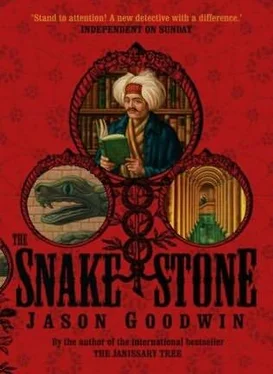Jason Goodwin - The snake stone
Здесь есть возможность читать онлайн «Jason Goodwin - The snake stone» весь текст электронной книги совершенно бесплатно (целиком полную версию без сокращений). В некоторых случаях можно слушать аудио, скачать через торрент в формате fb2 и присутствует краткое содержание. Жанр: Исторический детектив, на английском языке. Описание произведения, (предисловие) а так же отзывы посетителей доступны на портале библиотеки ЛибКат.
- Название:The snake stone
- Автор:
- Жанр:
- Год:неизвестен
- ISBN:нет данных
- Рейтинг книги:4 / 5. Голосов: 1
-
Избранное:Добавить в избранное
- Отзывы:
-
Ваша оценка:
- 80
- 1
- 2
- 3
- 4
- 5
The snake stone: краткое содержание, описание и аннотация
Предлагаем к чтению аннотацию, описание, краткое содержание или предисловие (зависит от того, что написал сам автор книги «The snake stone»). Если вы не нашли необходимую информацию о книге — напишите в комментариях, мы постараемся отыскать её.
The snake stone — читать онлайн бесплатно полную книгу (весь текст) целиком
Ниже представлен текст книги, разбитый по страницам. Система сохранения места последней прочитанной страницы, позволяет с удобством читать онлайн бесплатно книгу «The snake stone», без необходимости каждый раз заново искать на чём Вы остановились. Поставьте закладку, и сможете в любой момент перейти на страницу, на которой закончили чтение.
Интервал:
Закладка:
The giddy mix of styles was echoed in the street below. In the crowd that swirled up and down the Grande Rue were men and women of every nationality, and none: all the races of the Mediterranean, Arabs and Frenchmen, men in burnooses, men in hats, ladies in heels, broad-shouldered Slavs, punctilious Englishmen, Genoese sailors, Belgian tailors, black Nubians, olive-skinned Druze from the heights of Lebanon, pale Russians with fair beards, hawkers, loafers, actors, vagabonds, pimps, water carriers. Two dozen wandering street sellers cried their wares. A monkey jumped on a barrel organ. Even a bear shuffled its feet and looked around at the company with a pleasant grin.
Yesterday he had wondered where the great parade had gone, when it vanished from the court at Topkapi. Not to Besiktas, where a sultan lay dying in his European bed.
He pulled the bell of a large gray stone building set back slightly from the street, and a gray-faced flunky in immaculate tails answered the door.
“Monsieur Mavrogordato is at his correspondence. He won’t be seeing anyone before eleven.”
“Would you inform your master that I am a friend of the Frenchman Lefevre? I want to see him very urgently, on private business.”
The clerk pursed his lips and frowned. The Turk at the door was dressed in the old style, but he was dressed well. Had he been wearing the fez, like any man of business, he would have been easier to dismiss; but his turban lent him a sense of mystery, combined with that air of confidence that clerks were quick to detect. The combination might mean money. Private business, now. Certainly, his master liked to deal with his correspondence undisturbed. But he was not a man to relish missing an opportunity. Private business. Well, private business could mean many things.
“A few moments, efendi,” he said, with a greater show of politeness. “If you will step inside, I will carry your message in to Monsieur Mavrogordato.”
The hall was narrow and dark; there was nowhere to sit. Yashim stared out at the street through the glass panes of the door. The sunlit crowd flowed by at a steady rate; someone might stop or dawdle for a few moments, but the movement was strong and eventually picked the person up again, to vanish in the stream.
Yashim thought of the book that Grigor had shown him, with its sleeping emperors and ancient prophecies. How futile it seemed, this Great Idea! How shallow, against the deep drift of time and events. Byzantium was long gone. He remembered the old lines the Conqueror had murmured as he surveyed the ruins of the imperial palace. “The spider weaves a curtain in the Caesar’s palace: the owl hoots in the towers of Afrasiab.”
“Monsieur Mavrogordato will see you, efendi.”
Mavrogordato was small and square with dark hair and a carefully trimmed mustache. He sat with his jacket on the back of his chair, sleeves rolled, his thin white hairy forearms resting on a desk covered in papers, like a shipwrecked sailor clinging to a raft. It was hard to guess his age: fifty, maybe. Older than his wife. And Yashim had been right: the boy, Alexander, took after her.
“How do you do? Coffee? Stefan, coffee.” His voice had a rasp to it, and an accent that Yashim could not quite place. When Stefan had left the room he leaned forward, blinking.
“You have some business interest, ah”-he glanced down at a card on his desk-“Yashim efendi.”
“The name means something to you?” Yashim asked, cocking his head. The banker looked apologetically blank. “I thought-perhaps your wife…”
Mavrogordato startled. “My wife?”
There was a moment’s pause. Yashim fluttered his hands.
“Forgive me, I should explain. Maximilien Lefevre. The archaeologist.”
Mavrogordato frowned. “Lefevre,” he repeated. Then, in a somber tone, he added: “You haven’t heard?”
“I knew him slightly,” Yashim said slowly.
Mavrogordato gave a grunt. “Knew him. Hmm.” He began to tap his fingers absently on the table.
“I’m investigating his death. Trying to establish some facts.”
“I know nothing about that,” the banker said.
“I didn’t mean to suggest-” Yashim raised his hands. Even in this office he could still hear the murmur of the crowd outside, the faint ringing of little bells, the rattling of carriages on the cobbles. “You had met him, too?”
“I-he came here once. He wished to borrow some money.”
He paused. Yashim said nothing.
“I lent him the money,” the banker continued. “A small amount.” Mavrogordato paused, as if remembering, then levered himself briskly away from the desk. “Very unfortunate. But business must go on.”
“Of course, efendi. If I might just ask-did you talk together? He was an interesting man.”
Mavrogordato looked surprised. “I’m afraid I have no interest in archaeology. Dull of me, I am sure, but I am a man of business. You understand.”
Yashim cocked his head. “How much did he borrow?”
The banker blew out his cheeks. “If you ask me, I believe it was two hundred francs.”
“Ah. French money.”
“You know, these days…One can’t lend piastres.”
“Because…?”
“The value, it’s too unsettled.” Mavrogordato waved a podgy hand. “These are financial things, efendi.”
“About which I know so little,” Yashim agreed. “Is that why he came to you, do you think?”
Mavrogordato gave a deprecating shrug and picked up a paper on his desk. “I couldn’t say, efendi. I wish you luck.”
“Thank you so much for your time.” Yashim paused, with his hand on the doorknob. “One final thing I forgot to ask-what kind of security did Lefevre give you?”
For a moment Mavrogordato’s eyes searched the room. He gestured with the paper in his hand. “He was a Frenchman. It was only a small loan.”
“Yes, of course. He gave you nothing.”
As he closed the door, he saw that Mavrogordato was still watching him, blinking.
45
“Poor bastard,” Palewski said. He glanced through the window, where the bees were dozily buffeting the wisteria. “Don’t you find these summer evenings unbearably sad? It must be my age.”
Outside, a stork clattered its bill; a pair had lately taken up residence on the new pinnacle of the Galata Tower a few hundred yards away.
Palewski bent forward and retrieved the little book from the table. “Lefevre must have been very frightened to leave this in your flat.”
“I suppose he thought of it when I went to get him a berth on the boat,” Yashim said. “It cheered him up, somehow.”
“Thinking it was safe, yes.” Palewski could not quite rid his voice of its contempt.
He stuck his nose in the book and began to murmur to himself. Yashim helped himself to the ambassador’s tea and leaned back in his chair, trying to recall Lefevre’s mood, trying to remember their last words. He had got into that caique-how? He could remember that he, Yashim, had been slightly impatient with the whole affair-the money and Lefevre’s petulance about the boat. After that, he hadn’t paid Lefevre too much attention. He thought he would never see him again.
But Lefevre must have pondered the possibility. Hence the hidden book. And he had stepped into the bobbing caique and pushed off without a word.
There were many things you could find to dislike about Lefevre, but you couldn’t fault his bravery.
Meanwhile, everyone was shortly going to be invited to think that Yashim had killed him. It didn’t matter whether they believed it or not: just airing the possibility would be enough. Slander was raised only against the weak: nobody flung accusations at people whose power was secure. To be placed under suspicion showed a want of luck on Yashim’s part; and nobody in Istanbul, least of all in the palace, liked an unlucky man.
Читать дальшеИнтервал:
Закладка:
Похожие книги на «The snake stone»
Представляем Вашему вниманию похожие книги на «The snake stone» списком для выбора. Мы отобрали схожую по названию и смыслу литературу в надежде предоставить читателям больше вариантов отыскать новые, интересные, ещё непрочитанные произведения.
Обсуждение, отзывы о книге «The snake stone» и просто собственные мнения читателей. Оставьте ваши комментарии, напишите, что Вы думаете о произведении, его смысле или главных героях. Укажите что конкретно понравилось, а что нет, и почему Вы так считаете.












